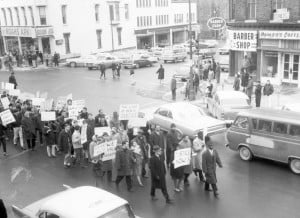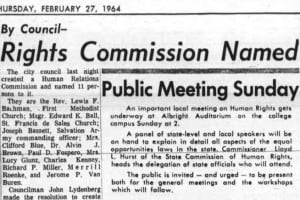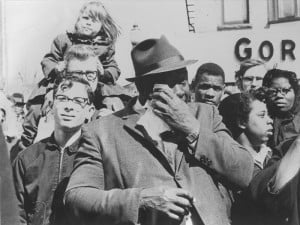Geneva and the Civil Rights Movement
By Anne Dealy, Director of Education and Public Information
Over the last few years the country has recognized the 50th anniversary of a host of milestones in the Civil Rights Movement of the 1950s and 1960s. At the same time, our nation has been grappling with contemporary issues of racism, political action and the mass demonstrations following unrest in Ferguson, Missouri and as part of the #BlackLivesMatter movement. As we at the Geneva Historical Society look back at the 1960s this year, we cannot ignore the protest movements that sprung out of that decade, particularly the Civil Rights Movement.
This movement affected Genevans, both white and black. From the 1940s through the 1960s, Geneva’s small but longstanding African-American community was expanded and reshaped by immigration from the south. The African-American population had declined steadily from its high point of 7.6% of the city’s population in the mid-19th century to less than 1% in 1940. It then jumped up to 4% by 1960. New people were drawn to the area during World War II as construction workers, military service personnel, and farm workers. After the war, demand for farm workers remained steady, and migrants often stayed in the area, drawn by employment opportunities in local industry and at the Seneca Army Depot. Some moving from the Jim Crow South thought they would find better education and jobs in the North for themselves and their children. Many were disappointed at the more subtle, but equally pernicious racism they encountered in trying to achieve these aims. This disappointment in combination with the actions occurring in the South motivated Civil Rights activity in many northern communities.
Some information on Genevans’ response to the Civil Rights Movement can be found in the Geneva Daily Times. The earliest mention of local activism I could find was a 1960 demonstration of the local NAACP chapter in front of the Woolworth’s at Town and Country Plaza on Routes 5 and 20. The participants explained that they were protesting the chain’s policies of segregation in southern towns like Greensboro, North Carolina. They did not have any complaint of discrimination at the Geneva store. A few years later, delegations of students from Hobart and William Smith Colleges lobbied for passage of the 1964 Civil Rights Act in Washington. Many local churches were also vocal in their support of the legislation. The biggest local action covered in the newspaper was a march planned by the NAACP held on March 20, 1965. The marchers started at Mount Cavalry Church of God in Christ on Milton Street and proceeding though downtown to City Hall on Castle Street. The participants were described varied from clergy to college students to average citizens of Geneva and an equal mix of black and white. The demonstration was held in the midst of the violence surrounding the marches from Selma to Montgomery and was intended to show support for activists in the south.
It was not long before marches supporting activists far away turned into activism for racial justice in Geneva itself. Both the newspaper accounts and oral histories collected during the Geneva Historical Society’s 1991 Make a Way Somehow exhibit project reveal the discrimination African-Americans faced in Geneva in finding well-paid jobs and quality housing. Housing discrimination was a serious problem in the city, made stark by the demolition of substandard buildings in the Urban Renewal project that housed mainly African-American families. No provision was made in the development process to build new affordable housing. The fifteen families displaced had difficulty finding new places to live in the city. Problems with housing led committed community members to push City Council to create the Geneva Human Rights Commission in February of 1964. The Commission was empowered to investigate complaints of housing discrimination and continues to combat such discrimination to this day.
A six-part series of articles in the Times in 1966 explored the employment situation in the city for African Americans. The reporter’s focus was mainly on the perspective of the employer, including banks, a grocery store, and the city of Geneva. However, he did include the perspective of representatives of the Human Rights Commission, skilled trade unions, the NAACP and three or four African-American citizens of the community. It seems clear from their statements, that while employers did not feel they discriminated against minorities, low turnover and bureaucratic systems made the entry of African-Americans into some jobs nearly impossible. Those young people who were ambitious often left the area for places where opportunities were better.
Following the death of Martin Luther King Jr. in 1968, the city’s African-American community recognized and celebrated the life and work of Dr. King with an annual commemoration of his birthday on January 15. As the day was not then an official holiday, many African-American parents kept their children out of school in order to participate in the events. They also spearheaded a drive beginning in 1971 to have the holiday recognized by the Geneva City School Board. Due to their persistence, the effort was finally successful in 1977, nine years before Martin Luther King Day became a federal holiday.
To further explore people’s memories and perceptions of the Civil Rights Movement we are hosting a Community Conversation on Civil Rights in collaboration with Mount Olive Baptist Church and the social justice group Tools for Social Change. This is not a formal presentation, but an opportunity for community members to share their thoughts, perceptions and experiences in discussion about the history of civil rights activism in Geneva and its future here. Geneva Historical Society staff will share some of the material from our collection related to the history of the African American community in Geneva. Participants are welcome to bring documents, photographs, or other materials related to the Civil Rights Movement to share. The public is welcome to attend the discussion and take part in the conversation. The program will be held on Tuesday, March 1 at 6:15pm at Mount Olive Baptist Church, 70 Clark Street.




I can identify one marcher in the Civil Rights March photo. The man on the left side of the first full row (wearing a clerical collar) is Rev. Dr. J. Richard Hart. He was the pastor of the First Presbyterian Church from 1959 to 1988.
Thank you! I will send the information to our archivist.